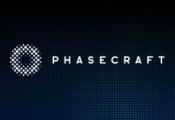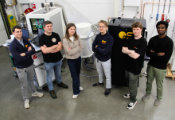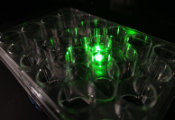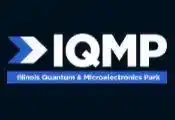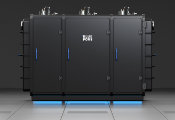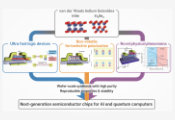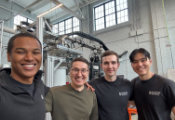Hewlett Packard Labs’ Quantum Supercomputing Framework Selected for DARPA Quantum Benchmarking Initiative
April 03, 2025 -- Two of the foundational principles that have contributed to Hewlett Packard Labs’ success over the years have involved the willingness to change direction on research projects and to tap outside resources to develop more holistic solutions.
Both of these principles came into play in Labs’ ongoing work to try to solve the seemingly impossible task of creating a functional quantum supercomputer. Labs’ quantum team pivoted to a new research strategy in 2023, and that move led to the company’s inclusion in an announcement today that promises to change the future of quantum computing.
“Our conclusion was that the current pace of innovation was too slow to reach utility-scale quantum computing in the next decade, so we decided to try something different,” said Masoud Mohseni, a Labs distinguished technologist who has been leading the HPE Quantum team the past two years. “We changed to a more open approach, bringing in partners that will foster innovation to potentially solve the really hard scaling problem that exist in quantum computing.”
Today’s announcement by the U.S. Defense Advanced Research Projects Agency (DARPA) includes Hewlett Packard Enterprise on a list of companies that have been selected in the initial stage of the government’s Quantum Benchmarking Initiative (QBI). The QBI program aims to determine if it is possible to build an industrially useful quantum computer much faster than conventional predictions. Its goal is to determine if such a computer can be built by 2033.
Labs is taking the lead
Hewlett Packard Labs is leading the quantum initiative for HPE, overseeing the research effort and acting as a quantum system integrator for a group of six other partners where each are industry leaders in their respective fields. Dr. Mohseni is leading the full-stack quantum-HPC integration and all software developments including quantum algorithms, quantum error-correction, heterogeneous high-performance quantum-classical architectures, quantum applications and benchmarking. Prof. John Martinis, CTO and co-founder of Qolab Inc., is leading all quantum hardware efforts, including design and fabrication of qubits, control electronics, and system engineering.
Qolab’s Martinis stands as a pivotal figure in the alliance, bringing decades of groundbreaking expertise to the forefront. Renowned for his pioneering work on superconducting qubits, Martinis has been instrumental in advancing quantum computing, including achieving the landmark quantum supremacy result. His relentless pursuit of innovation has not only redefined the boundaries of computational possibilities but also cemented his central role in shaping the quantum industry. Under his leadership in quantum hardware, the alliance is poised to harness state-of-the-art quantum technologies to revolutionize industries and solve some of the most complex challenges of our time.
Mohseni, who joined Labs in 2023 after 10 years at Google Quantum AI Lab, assembled a coalition of research partners. His team at HPE developed adaptive quantum algorithms for distributed quantum computing, novel architectures for heterogenous high-performance quantum-classical co-processing, and software stack for quantum applications development, quantum compliers, and runtime extensions under Cray programming environment.
The alliance that will work on the benchmarking initiative was formed before DARPA put out a call for proposals to submit plans for the development of a functional, cost-effective quantum computer. The partners participated in joint research that led to both the DARPA proposal and the release of a paper, “How to Build a Quantum Supercomputer: Scaling From Hundreds to Millions of Qubits,” at the SC 24 supercomputing conference.
“Working as a consortium, we came up with a less ambitious but more practical target of building high-performance quantum-classical coprocessors that could be met by employing state-of-the-art semiconductor fabrication and supercomputing,” Mohseni explained. “This could allow us to design and test high-quality quantum components and system integration at all intermediate scales with accelerated pace and reduced cost.”
The consortium takes advantage of a wide range of partner capabilities, integrating atomically accurate fabrication methods and design simulations with innovations in software scaling and real-time error correction.
Following is a list of partners and their contributions to the consortium.
Applied Materials: Material development and wafer-level fabrication
Applied Materials leverages its expertise in materials engineering, advanced packaging, and nanofabrication to drive innovations in quantum computing. By collaborating across the ecosystem, the company is advancing the development of superconducting qubits with improved error rates and uniformity, supporting the scalability of next-generation quantum architectures. Applied’s contributions to this consortium highlight the company’s commitment to accelerating solutions for scalable quantum computing through its leadership in materials engineering and manufacturing.
Synopsys: Modeling and simulation, EDA tools and semiconductor IP
With decades of experience in solving engineering complexity and delivering breakthroughs from silicon to systems, Synopsys is contributing its industry-leading expertise in modeling and simulation, design automation, semiconductor IP, and cryoCMOS design to help realize scalable quantum computing solutions. Synopsys can drive the evolution of quantum computing technology toward market readiness by addressing challenges in qubit design, fabrication, algorithms, and applications.
Qolab: Qubit and circuit design
Qolab is spearheading hardware development in the consortium, focusing on fabrication and control electronics. Leveraging its deep expertise in quantum physics and the capabilities of the semiconductor industry, Qolab is driving rapid advancements in scaling superconducting qubits. Recognizing the critical need for significant improvements in qubit fabrication, Qolab is dedicated to overcoming these challenges to enable the development of commercially viable quantum computers.
Quantum Machines: Quantum hardware control and real-time quantum error correction
Quantum Machines (QM) is a leading provider of quantum control solutions, driving the advancement of quantum computing with its Hybrid Control approach. By seamlessly integrating quantum and classical operations, Hybrid Control eliminates friction and optimizes performance across hardware and software, enabling researchers and quantum computer builders to iterate at speed, resolve setbacks, and bring visionary ideas to life. OPX1000, QM's modular, high-density quantum control platform, is built around this Hybrid Control approach, placing classical resources, as close as possible to the qubits – delivering unmatched real-time performance at scale, along with the agility, flexibility, and ease of use needed to power the world’s most advanced large-scale quantum computers.
1Qbit: Fault-tolerant quantum error correction design and simulation, quantum algorithm compilation, and automated resource estimations
1QBit is advancing the field of quantum computing through benchmarking studies that assess the impact of quantum hardware specifications, such as noise characteristics and manufacturing imperfections, on the resources required for utility-scale quantum computers. Using its Topological Quantum Architecture Design (TopQAD) software suite, 1QBit analyzes hardware characteristics, fault-tolerant quantum computing (FTQC) protocols, quantum error correction, and quantum networking requirements. This comprehensive approach supports the efficient design and simulation of scalable quantum architectures.
University of Wisconsin: Algorithms, benchmarks
Professor Matthew Otten, a quantum benchmarking expert from the University of Wisconsin, plays a pivotal role in assessing the progress of the consortium toward quantum advantage for utility-scale applications. His expertise in quantum algorithms is also instrumental in driving the consortium’s objectives forward.
‘A coalition of best-of-breed entities’
Mohseni said he looks forward to leveraging the consortium contributors’ broad range of skills in the first stage of the DARPA QBI project.
“Bringing together research groups from a diverse set of companies and organizations, we can design and build a full-stack platform for high-performance hybrid quantum-classical computing,” Mohseni said.
“This coalition of best-of-breed entities brings real expertise in specific areas important to the development of a tangible quantum solution,” added Qolab’s Martinis. “We take a systems engineering approach, where one embraces the idea that many system parameters must be simultaneously optimized for a complex system.”


